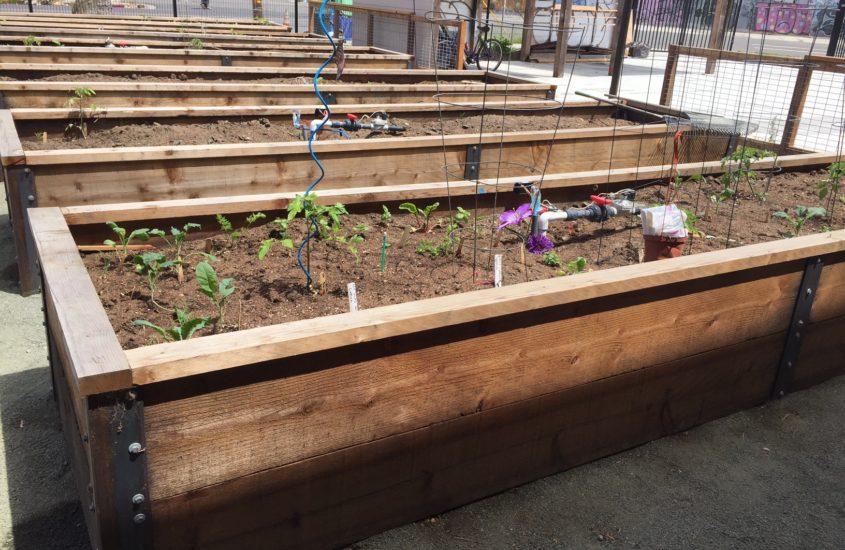West Oakland Farms by: Rae Ferrer

Located by a BART overpass with the sound of trains periodically whizzing by is a small, vibrant piece of farmland. It seems out of place surrounded by two-story houses, with traffic around the corner and a tall US Post Office building right across the street. This small plot of land filled with life seems nothing short of a miracle.

(c) City Slicker Farms
The location of the farm is fascinating in itself, but the true spectacle of this project is that it’s tended by ex-inmates.
The city of Oakland is deprived of farm-fresh produce. Elaine Brown, a former leader of the Black Panther Party, launched an urban farm in West Oakland to bring produce to the community, as well as to employ black former offenders. The farm has been open for over a year and is Brown’s way of combating the rapid gentrification in the area due to condominium developers transforming the area’s land into high rises. Brown also hopes to give an avenue for formerly incarcerated men and women to gain work experience.
“We thought we would be able to do something more meaningful than what other people had slated for these properties,” Brown said of West Oakland Farms’ land.

(c) Oakland and the World Enterprises
West Oakland Farms and the work that Brown has planned for the future have manifested from her passion in the work of the Black Panther Party, a revolutionary Black nationalist and socialist organization that challenged the police brutality in Oakland. The Panthers were active from the mid-60s until the early 80s.
For Brown, who led the Party during the mid-70s, the transition to running an urban farm isn’t random. During that era, social programs became a large part of the organization’s work. The Panthers organized free breakfast for school kids and groceries for the public, helped out in health clinics, and provided produce from their own urban gardens in West Oakland.
West Oakland Farms could not have succeeded without Alameda County Supervisor Keith Carson. Carson hired Brown to work on a temporary assignment in several projects centered in West Oakland. In July 2014, the two co-founded a nonprofit organization, Oakland & the World Enterprises, Inc., which acquired the .67-acre lot of land located on Seventh Street and Campbell Street, now vibrant with fresh produce. The urban farming project is only the first of many programs for Oakland & the World Enterprises. Brown plans to open a slew of other businesses and build up to 70 apartments on the site.
The whole point of West Oakland Farms, says Brown, is to develop a model of success. It’s meant to create pathways for people to develop independence and it will finance, launch and help sustain formerly incarcerated people until they’re back on their feet Civil Eats, a daily news source for critical thought about the American food system, wrote a story on Brown and West Oakland Farms in September 2015.
“I’m not in the farm business,” Brown said in the report. “I’m in the business of creating opportunities for Black men and women who are poor and lack the education, skills, and resources to return to a community that is rapidly gentrifying without economic avenues for them in mind.”
The farm contains 40 raised beds growing flowers and vegetables, including a winter crop of tomatoes, kale, corn, peppers and squash. Brown recruited Master Gardener and Project Manager Kelly Carlisle, an ex-Navy officer and East Oakland resident, to tend to the garden. Carlisle also runs the nonprofit Acta Non Verba: Youth Urban Farm Project, which teaches children how to garden.
“Working with kids is one thing. Working with adults who have been in prison is something else,” Carlisle said. “Some of my crew ask if they can go to the bathroom. That’s how ingrained prison culture is for them.”
The farm employs 10 ex-inmates on a part-time basis, which rotates each week. Four farmers work three days a week for about four hours a day and are paid $20 an hour. Unlike many other urban farms, West Oakland Farms is a for-profit organization that is collectively owned by the farmers.
“People who are formerly incarcerated and are looking for work, a lot of the times we don’t get hired because of our background,” said Tyan Bowens, one of the farmers at West Oakland Farms. Bowens served three months at San Quentin State Prison for drug dealing charges. Now, he’s proud to be one of the worker-owners.
“If you don’t get afforded the chance to get out and prove yourself and show that you have a work ethic, you’re left to fend for yourself on the streets and go back to dealing, which I choose not to do,” Bowens said.
West Oakland Farms provides a means for people to dig themselves out of the terrible quagmire of poverty and incarceration. By providing opportunities for these men and women, as well as fresh produce for a neighborhood that is deprived of locally grown food, Brown and West Oakland Farms has given people inspiration to continue giving back to the community.



